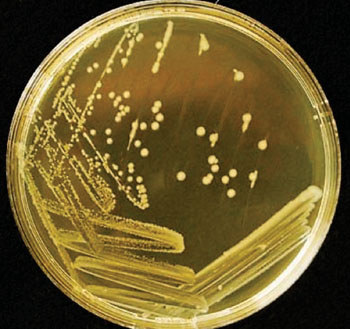New Types of African Salmonella Associated with Lethal Infection
By LabMedica International staff writers
Posted on 07 Sep 2016
The first global-scale genetic study of Salmonella enteritidis bacteria, which is a major cause of blood poisoning and death in Africa and food poisoning in the Western World, has discovered that there are in fact three separate types.Posted on 07 Sep 2016
An epidemiological paradox surrounds Salmonella enterica serovar Enteritidis. In high-income settings, it has been responsible for an epidemic of poultry-associated, self-limiting enterocolitis, whereas in sub-Saharan Africa it is a major cause of invasive nontyphoidal Salmonella disease (iNTS), associated with high case fatality.

Image: Colonies of Salmonella enterica Serovar Enteritidis streaked on a Luria Agar plate and incubated at 37 ºC for 24 hours (Photo courtesy of Kevin Hedetniemi and Min-Ken Liao).
An international team of scientists associated with the Wellcome Trust Sanger Institute (Hinxton, UK) sequenced 675 isolates of S. enteritidis from 45 countries and six continents. Analysis of the Salmonella genomes revealed three major types, common global one and two novel African types. Routine microbiological testing is not able to distinguish between the S. enteritidis circulating in Africa and the rest of the world. Identifying these new types is important because the common global type of S. enteritidis is normally associated with poultry and predominantly infects the intestine, causing diarrhea.
However, in Africa the two newly identified types are a major cause of blood poisoning and death, because in people with weak immune systems, Salmonellae are able to pass with greater ease from the gut into the bloodstream. The environmental reservoir from which these African bacteria are transmitted to people is unknown. The team also showed that the two African types carried more of the genes that give them resistance to common antibiotics. These strains do not respond to the antibiotics commonly available, and have to be treated with cephalosporins or ciprofloxacin, antibiotics of last resort in many African settings.
Nicholas A Feasey, MBBS, MRCP, FRCPath, DTM&H, the first author of the study, said, “Invasive nontyphoidal Salmonella disease is a huge problem in Africa, but it is difficult to identify due to lack of laboratory capacity and difficult to treat due antibiotic resistance. Using whole genome sequencing of S. enterica Serovar Enteritidis bacteria from different settings we have revealed three distinct types of this bacteria, which was previously thought to have only one type. In the two novel types of S. enteritidis we found resistance genes to antibiotics such as amoxicillin and chloramphenicol that are still widely used in Africa and it may be only a matter of time before resistance to the last line antibiotic, cephalosporin, spreads. We urgently need to find strategies to eradicate this disease.” The study was published on August 22, 2016, in the journal Nature Genetics.
Related Links:
Wellcome Trust Sanger Institute













